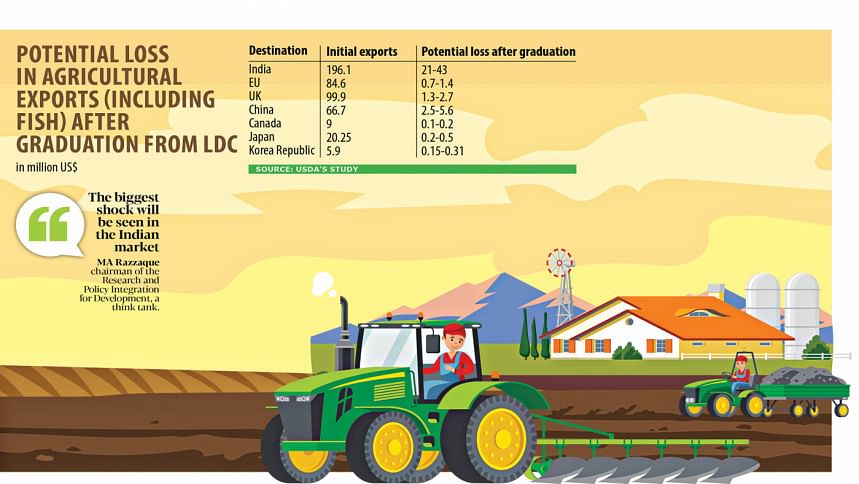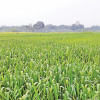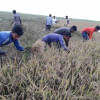Farm exports likely to fall up to 11% in key markets

The agricultural export from Bangladesh could decline as high as 11 per cent in the nations that are the biggest GSP facility providers following the country's LDC graduation, according to a new study.
Bangladesh's agricultural exports, including fish, to the seven largest Generalised System of Preferences (GSP) granting countries and blocs – India, the European Union, China, the UK, Japan, Canada and South Korea -- would be subject to a 6 per cent to 11 per cent loss as a result of the imposition of the tariff after graduation from the group of the least-developed countries (LDCs).
"The biggest shock will be seen in the Indian market," said Mohammad Abdur Razzaque, chairman of the Research and Policy Integration for Development, a think tank. The export loss would be between 11 per cent and 22 per cent, or $21 million to $43 million, he said.
Razzaque shared the information at a seminar while presenting a keynote paper on "Implications of LDC Graduation for Bangladesh's Agricultural Goods and Trade: Issues and Policy Options" in the capital's Agargaon.
The seminar was organised by the Economic Relations Division (ERD) and the US Department of Agriculture.
Exports to South Korea and China could shrink by 5.3 per cent and 8.4 per cent, respectively, according to Razzaque.
The economist said the average tariffs on Bangladesh's agricultural exports might increase in major overseas markets after graduation in the absence of duty-free facilities.
In this context, he put emphasis on proactive engagement with trading partners to negotiate extended preferences, enhancing the capacity of domestic firms, and reducing the cost of doing business to address the LDC graduation challenges.
At the seminar, a number of speakers said Bangladesh should pursue the World Trade Organisation (WTO) so that it is included in the list of net food-importing developing countries after graduation in a bid to continue providing subsidies on agriculture exports.
At the same time, the country should also develop export assistance schemes in compliance with WTO provisions, they said.
Razzaque said as the domestic support provided for agricultural production is much lower than the limit set by the WTO, Bangladesh will not face issues in widening the volume of domestic subsidy.
"However, the country could face significant challenges in continuing targeted export incentives for agricultural products. Boosting the competitiveness and productive capacity of agricultural producers is crucial for expanding exports."
He went on to say that tackling the high costs of doing business and improving connectivity and trade facilitation will be important to boost export competitiveness.
The government should focus on export diversification within the agricultural sector while ensuring product quality and categorising the subsidies prudently, Razzaque recommended.
Agriculture Minister Muhammad Abdur Razzaque said that Bangladesh can mitigate the impact of LDC graduation by enhancing the production and quality of its agricultural products.
State Minister for Planning Shamsul Alam said the withdrawal of LDC-specific facilities after graduation will create the compulsion for enhancing internal capacities. ERD Secretary Sharifa Khan put emphasis on policy continuity for maintaining the growth in the agricultural sector.
She said that the government is pursuing with the WTO to be included in the list of net food-importing developing countries after graduation.
Farid Aziz, additional secretary of the ERD, said the government has taken various measures to ensure a smooth and sustainable transition from LDC status.
Mostafa Abid Khan, a former member of the Bangladesh Trade and Tariff Commission, Md Tofazzel Hossain, additional secretary of the fisheries and livestock ministry, Md Tajul Islam Patwary, director of the Department of Agricultural Extension, Scott Brandon, political and economic counsellor of the US embassy in Dhaka; and Uzma Chowdhury, director of Pran-RFL Group, also spoke.

 For all latest news, follow The Daily Star's Google News channel.
For all latest news, follow The Daily Star's Google News channel. 








Comments